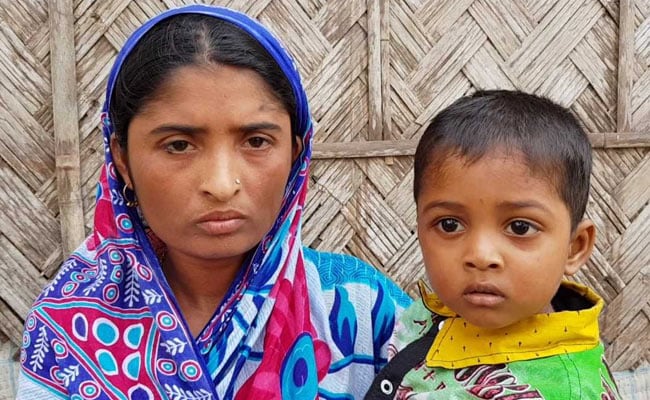
Rahima Khatoon, wife of late Yakub Ali with their 3-year-old son Rezabul
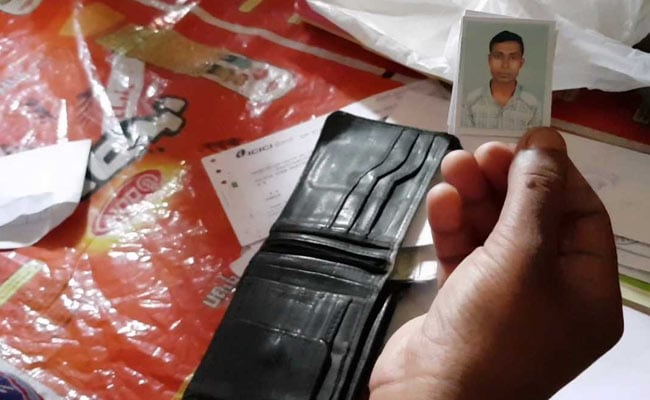
Photograph of 22-year-old Yakub Ali
The Karwan-e-Mohabbat is a peace yatra, a month-long journey of solidarity which hopes to reach out to families of victims killed in forgotten incidents of violence across India, some of them in horrific mob lynchings. "It is impossible for us to stay quiet in the face of this climate of hate and of violence. People must act in whatever way they can against the intolerance that threatens to destroy our country," says Harsh Mander, Director of Aman Biradari Trust, explaining why he felt the need for a Karwan-e-Mohabbat.
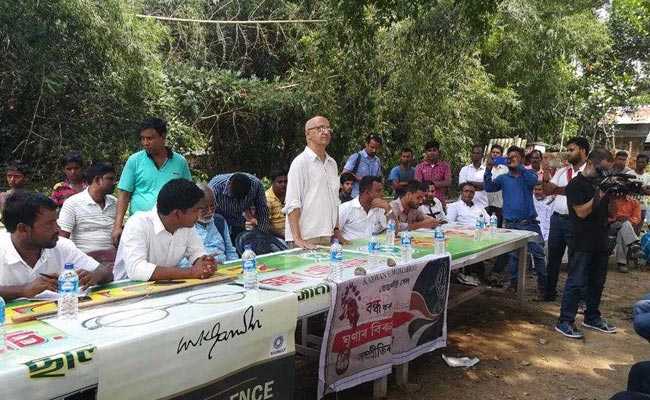
Human rights activist Harsh Mander addressing a Kokrajhar community meeting
To the visitors, the people of Goalpara spoke of the trauma of losing "our boy". Some brought papers to show us proof of citizenship that went back generations. (Human rights organizations have already expressed concern that D-voter surveys are playing into vicious communal politics in the state.)
Hussain Ahmed Madani, Executive President of the Satra Mukti Sangram Samiti, a student organisation, had captured the protest in which Yakub was shot on his mobile phone. The video reveals unarmed protesters holding banners and raising slogans against D-voter surveys. It shows the police using lathis on the crowd, then some stones are pelted, and minutes later, a policeman fires straight into the crowd. Yakub is hit and falls to the ground. "Even if they wanted to stop the protest, the police could easily have done so without killing a young unarmed man," Hussain said. His videos should have become clinching proof of a murderous lapse by the police but no formal investigation has been ordered. Barring local Assamese news, Yakub's death was overlooked by the media.
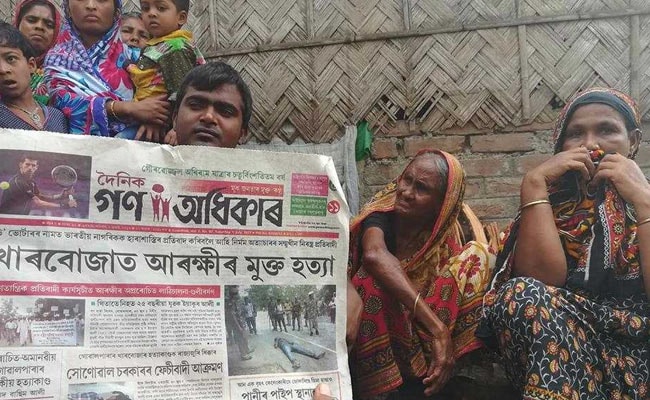
A local Assamese newspaper Dainik Gana Adhikar which reported the police firing on a peaceful protest against D-voter surveys on June 30.
I had joined the Karwan on its first leg in Assam, as part of a reporting assignment for NDTV's India Matters. It became clear from day one that this journey would provide a crucial opportunity to revisit stories that slip away far too easily from the news radar. Assam as a North-East state is in any case hardly on the mainstream radar.
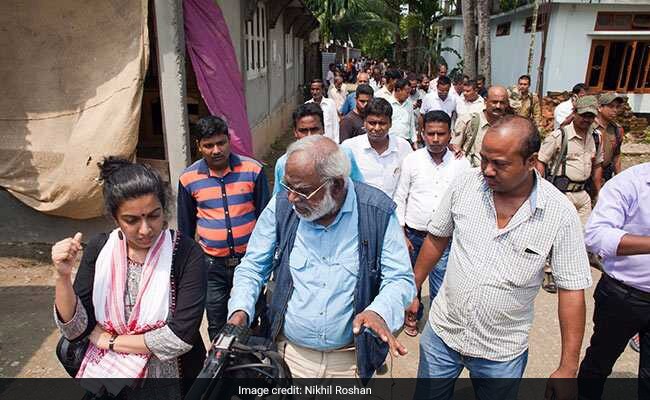
With human rights activist John Dayal
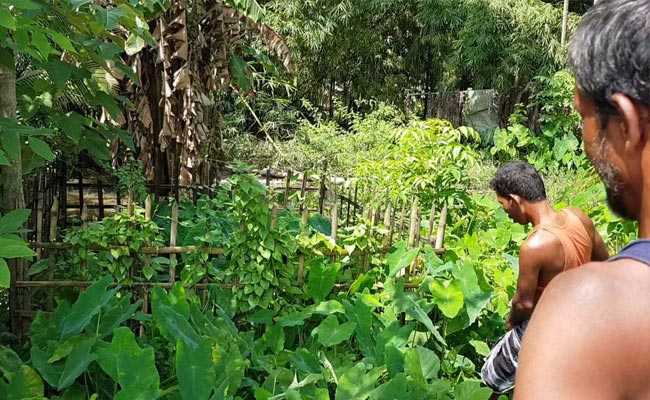
Burial ground of 16-year-old Hanif and 18-year-old Riazuddin in Nagaon, Assam
Harsh Mander knows there are many who will look upon an idea of a peace yatra with cynicism, words like "bleeding heart", "typical", "activists" will be put together in different ways to describe the Karwan-e-Mohabbat. He is used to it. "It is no longer possible to be a mute spectator. The Karwan-e-Mohabbat is a call of conscience to India's majority," he tells journalists.
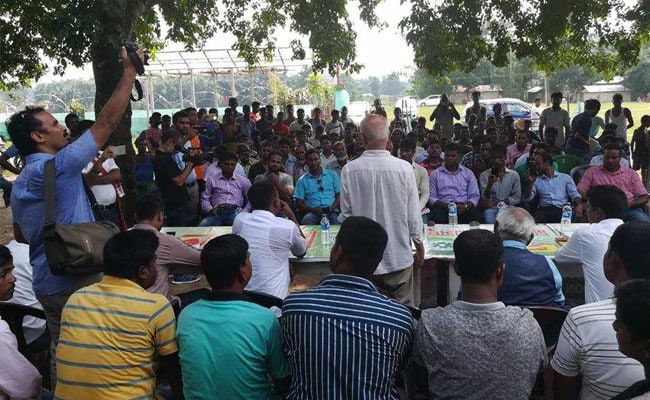
Community meeting in Kokrajhar, Assam
As I flew back from Assam, completing the first part of the journey with the Karwan, I clicked this image.
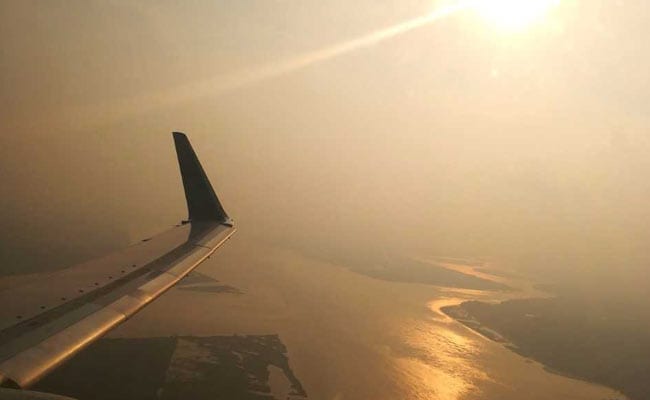
Golden rays of the sun on the river Brahmaputra
Azan Fakir, a popular Sufi poet of the 17th century, is sung across Assam. He is famed for having set Zikirs or Quranic recitals to the tune of Hindu religious hymns. Over time, Fakir's following began to grow. Jealous of Fakir's popularity, a Muslim official, Rupai Dadhora convinced the Ahom king that Azan Fakir was a Mughal spy and that his eyes should be plucked out. On hearing this, Azan Fakir asked for two earthen pots into which he let his two eyes drop. Subsequently, the charges against Fakir were proved false. To atone for his mistake, the king had a pagoda built in his honour. To this day, the Azan Pir Dargah attracts lakhs of devotees, Muslims and Hindus.
I thought of the Azan Fakir verse that a young girl had sung at the youth meet organized as a Karwan-e-Mohabbat night in Guwahati:
"Mor Mana aan bhav nai oh Allah
Mor Manat aan bhav nai
Hindu ki Mussalman ek Allar farman
mor manat aan bhav nai
Hinduk purina, Musalamanak patina
eke khan jamina tatar..."
"In my mind I do not make any distinction between a Muslim and a Hindu.
O Allah, when dead,
a Hindu will be burned,
a Muslim will be buried
under the same earth..."
(Priya Thuvassery is a senior producer with NDTV and a documentary filmmaker.)
Disclaimer: The opinions expressed within this article are the personal opinions of the author. The facts and opinions appearing in the article do not reflect the views of NDTV and NDTV does not assume any responsibility or liability for the same.


